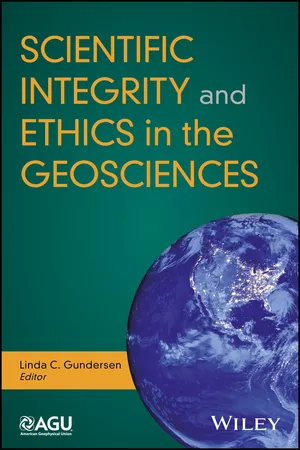
- English
- ePUB (mobile friendly)
- Available on iOS & Android
Scientific Integrity and Ethics in the Geosciences
About This Book
Science is built on trust. The assumption is that scientists will conduct their work with integrity, honesty, and a strict adherence to scientific protocols. Written by geoscientists for geoscientists, Scientific Integrity and Ethics in the Geosciences acquaints readers with the fundamental principles of scientific ethics and shows how they apply to everyday work in the classroom, laboratory, and field. Resources are provided throughout to help discuss and implement principles of scientific integrity and ethics.
Volume highlights include:
- Examples of international and national codes and policies
- Exploration of the role of professional societies in scientific integrity and ethics
- References to scientific integrity and ethics in publications and research data
- Discussion of science integrity, ethics, and geoethics in education
- Extensive coverage of data applications
Scientific Integrity and Ethics in the Geosciences is a valuable resource for students, faculty, instructors, and scientists in the geosciences and beyond. It is also useful for geoscientists working in industry, government, and policymaking. Read an interview with the editors to find out more:
https://eos.org/editors-vox/ethics-crucial-for-the-future-of-the-geosciences
Frequently asked questions
Information
Section V:
Scientific Integrity, Ethics, and Geoethics in Education
12.
EXPERIENTIAL ETHICS EDUCATION
Abstract
Throughout human history most people have learned in an experiential way, as observers of and participants in their local environments. While many learners and practitioners across the globe consider “modern” education as a teacher‐led, textbook‐based method of learning, delivered en masse, that approach has only been in practice for about the last 150 years. However, this form of education has been criticized for not infusing the learning environment with experience. Dewey (1938) considered experience as central to the educational process, and Freire (1970) encouraged active participation in learners as opposed to being passive receptors of knowledge. Both educators espoused using the community as a schoolhouse from which to gain and share experience. Drawing on the idea of a “community of practice”, Lave and Wenger, 1991 offer a modern update to apprenticeship, framing “Legitimate Peripheral Participation” as a means by which new learners gain experience. A learner begins as an observer and minor actor (apprentice), and then progress to a more involved actor‐participant level (journeyman), before they become a full‐fledged participant (master) in the craft. Parents view a similar process as children go through developmental stages towards adulthood. As academics, we experience similar stages as graduate students progress from their first class to their dissertation to their first post‐doctoral job. However, what are graduate students learning as they progress through a doctoral program? Certainly they are learning content as they progress towards mastery. Yet, it is one thing to learn content, and another thing to learn how to apply knowledge and skills in a responsible and ethical manner. In the past, the tendency of those in both the hard and soft sciences to reproduce studies and publish in refereed journals offered a check and balance to research and scholarship, lending a self‐correcting nature to the field. However, the growth of PhDs in these fields coupled with the intensifying pressure to publish to stay competitive in both academia and industry has resulted in an increase in undesirable research related behaviors, which risk a loss of legitimacy and credibility in the sciences. High levels of undesirable research behavior and high‐profile cases of research misconduct threaten research integrity and “damage to institutions’ reputations, and loss of public trust in the research process” (Martinson, Thrush & Crain, 2013, p. 2). Academia, industry, and the public they serve all stand to benefit from a rigorous and systematic incorporation of ethics into the programs, products, and mindsets of all stakeholders involved in the research process. The question is, how do these stakeholders, especially graduate students master the inculcation of ethics into their approach towards their studies? Mumford (2007, 2008) discusses a 2 day ethical training program which yielded long‐term retention of the ethical material. This experiment was conducted on first year graduate students who showed retention over 6 months. In this article we will propose Mumford’s work as a basis for the ethical content which graduate students should learn. We will then discuss applicable learning theories to describe the potential best way to convey the material, initially and over time. We will finally examine the importance and potential of creating an ethical culture within the university.
12.1. Introduction
As all experienced teachers know, just presenting important learning contents to students is far from guaranteeing that they will be remembered a month later. We need to make sure that the importance of these challenges “sinks in” and this can best be achieved by creating situations in which students encounter them in personal and concrete ways (p. 14).
Table of contents
- COVER
- TITLE PAGE
- TABLE OF CONTENTS
- CONTRIBUTOR LIST
- PREFACE
- ACKNOWLEDGMENTS
- Section I: Examples of Recently Developed International and National Codes and Policies
- Section II: The Role of Geoscience Professional Societies in Scientific Integrity and Ethics
- Section III: Scientific Integrity and Ethics in Publications and Data
- Section IV: Ethical Values and Geoethics
- Section V: Scientific Integrity, Ethics, and Geoethics in Education
- Appendix A: CASE STUDIES FOR SCIENTIFIC INTEGRITY AND GEOETHICS PRACTICE
- Appendix B: RESOURCES AND REFERENCES FOR SCIENTIFIC INTEGRITY, ETHICS, AND GEOETHICS
- Index
- End User License Agreement